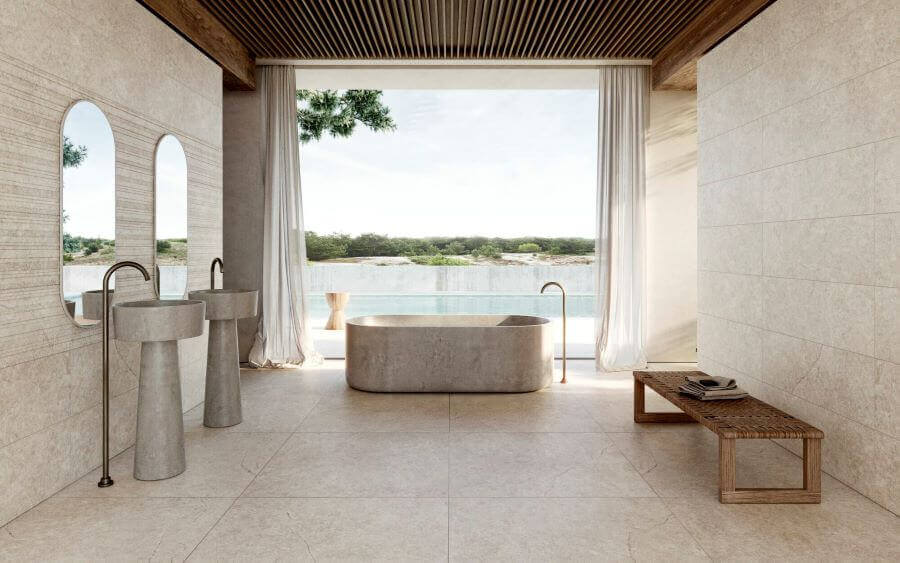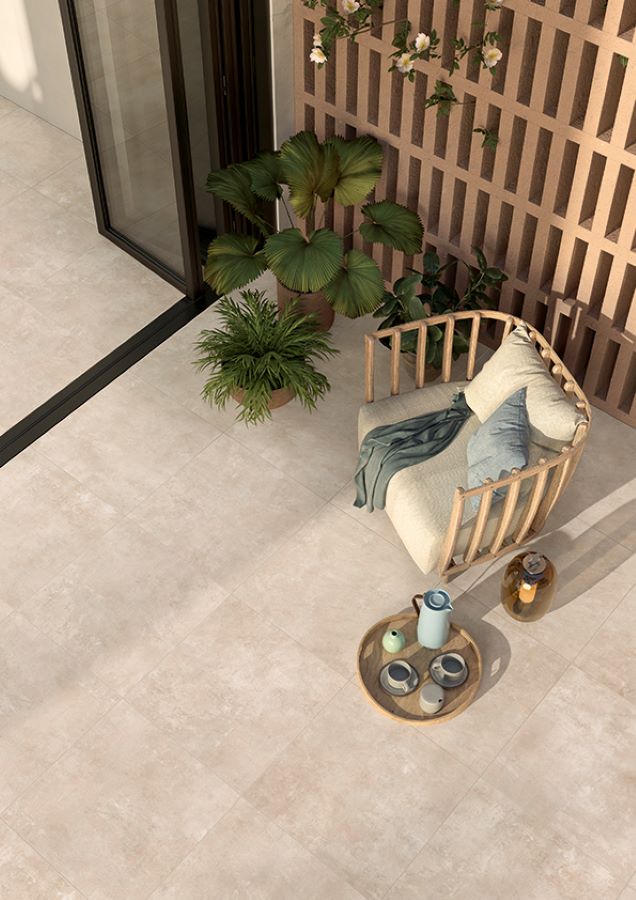
One question that is often asked is, are porcelain floor tiles cold? Well, the answer is both yes and no and really depends on what you do with your tiles. The beauty of porcelain is you can easily warm it up in the winter with an underfloor heating system and your porcelain floor can easily keep you cool in the summer. Porcelain heats up quickly, retaining the heat well with underfloor heating systems. At the same time, in the heat of the summer, porcelain can provide a cool canvas for your home bringing you the best of both worlds. We explore more in our blog.
Perhaps a good place to start is why you would opt for porcelain tiles for your home. Porcelain is a material that ticks all the boxes. Hardwearing, scratch resistant, stain resistant, highly durable, easy to clean, hygienic, beautiful – the list goes on. This is a material that is super versatile and makes a brilliant canvas for ground floors, inside and outside as well as bathrooms, boot rooms, offices, studios, dining rooms, lounges, hallways and more. Because porcelain tiles are made from a mixture of clays and minerals and fired at high temperatures, they are very hardwearing.
Unlike carpet there is nowhere for dust and dirt to hide and they won’t stain.
Unlike natural wood, porcelain won’t bend or warp and can easily be mopped with water.
Unlike real marble, porcelain is a hard material that won’t wear with age and is highly stain resistant so red wine is no match.
And unlike natural stones, porcelain doesn’t need regular sealing or ongoing maintenance.
This is a super hardwearing, highly versatile material that will stand the test of time.
Because porcelain tiles are available in so many designs and deliberately designed to echo other materials mentioned above you can have the best of both worlds. A marble porcelain tile that is very hardwearing and a cinch to maintain. A wood effect porcelain tile that can be used in the bathroom and so on.
Not necessarily. Even without underfloor heating, porcelain tiles retain heat well so any tiles in a sunny spot in your home will warm up with the sun and hold and keep that heat for a while even when the lovely sun disappears. Installing underfloor heating amplifies this effect turning tiles into something of a thermal brick and your room into a lovely warm, cozy space.
Underfloor heating can be a cost-effective way to warm your home and negates the need for radiators in the room. If you are looking for a material to work well with underfloor heating then look no further. Porcelain tiles tend to be thinner than other hard floorings such as natural stone. A porcelain tile is typically around 8-10mm thick whereas slates, travertines and marbles tend to be much thicker eg 10-20mm thickness. This means that porcelain tiles tend to heat up relatively quickly and they will retain their heat.
In fact, porcelain also helps ensure even heat distribution keeping floors toasty warm across the board. And of course, aswell as underfloor heating, using rugs or mats can add warmth and texture to spaces too.
Whilst we are not here to run through the do’s and don’ts of underfloor heating, it is important to ensure that your installer allows for movement joints and uses a decoupling membrane for larger floors because underfloor heating can cause some movement in the sub floor. In addition, flexible adhesives and grout must be used and it is really important that the underfloor heating system is off whilst tiles are being installed and remains off until adhesive and grout have fully cured or dried. The timings of this may vary depending on the adhesive brand used so check beforehand. And when your underfloor heating is switched on, ensure you follow the manufacturers guidance on how do that, because it should be turned up gradually.
As well as all the great reasons we have explored above, porcelain really is unrivalled when it comes to the brilliant array of designs, colours and finishes.
With great quality porcelains mimicking everything from natural stone to woods, concretes, cements, marbles and more this is a material that not only brings beauty to any space, but all the incredible hardwearing properties we have already looked at.
Add to that porcelain’s compatibility with underfloor heating and here is a flooring product that is both practical and beautiful in equal measure. Not only that, porcelain is super easy to maintain – following a thorough initial clean usually undertaken by the installer, on the whole porcelain tiles simply need a good brush or sweep followed by a mop and warm water to keep them in tip top condition.
Porcelain tiles can feel cold underfoot, particularly in cooler climates. However, there are so many advantages to using porcelain tiles in the home as we have seen and there are some great solutions like underfloor heating, insulation and using rugs that mean you really can enjoy all the beauty and practicality of porcelain tiles and keep toes toasty warm.
We’d love to help! Get in touch and let us start searching for beautiful tiles with you! Or simply click on any of the links under the photos above to start exploring our website!
If you would like to know more, please get in touch...
The TilePortfolio specialise in Italian and Spanish Porcelain and Ceramic tiles, in particular large format Porcelains and Porcelain tiles for inside and outside. Our carefully curated, stunning tile portfolios are beautifully presented online and supported by our fuss-free ‘go-the-extra-tile’ service. In addition, you can view our entire tile collection at our Northamptonshire Showroom. Visit our website for unmissable interiors inspiration. The TilePortfolio team are always available to chat, we’d be delighted to help with your project so please do get in touch.
Please note: We strongly recommend using a professional tiler for your project. Installation requirements may vary depending on the tiles you choose, the fixing products used and the specific conditions. Always check with your tiler regards the suitability of the tiles. Please get in touch with us if you have any questions.
GET IN TOUCH
Call, Text, WhatsApp: 07395 011861
Landline: 01536 856 108
Email: hello@thetileportfolio.co.uk
Visit Us: The TilePortfolio Showroom, Glebe Farm,
A14, Junction 7, Kettering, NN16 8XF
Company No. 13033923
VAT No. 376573947
Reg. Office: Headlands House 1 Kings Court
Kettering, Northants, NN15 6WJ
2024 © Copyright The TilePortfolio Limited
